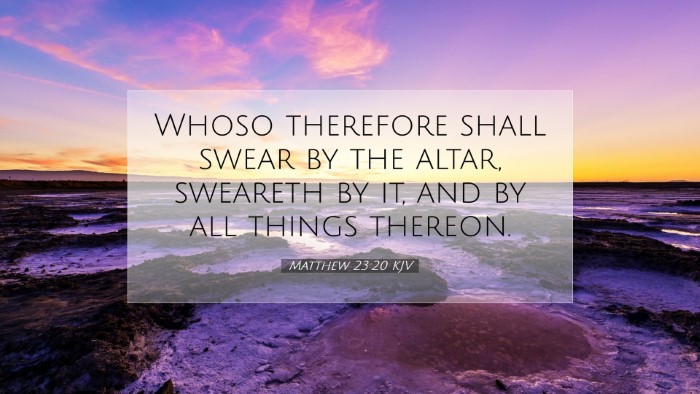Bible Commentary on Matthew 23:20
Verse Context: In Matthew 23:20, Jesus addresses the Pharisees and the teachers of the law, highlighting their practices of oath-taking and the implications of their words. The verse states: “Therefore, whoever swears by the altar swears by it and by everything on it.” This reflects broader themes of integrity, the ethical implications of spiritual leadership, and the nature of true worship versus mere ritual.
Commentary Insights
This verse is situated within Jesus' broader denunciation of the religious leaders of His time, specifically the Pharisees. The emphasis on swearing by the altar goes beyond mere ritualistic observance; it illustrates a profound misunderstanding of the weight and significance of what they were doing.
Matthew Henry's Commentary
Matthew Henry elaborates that swearing by the altar highlights the superficiality of the Pharisees' religion. They engaged in a practice that was ceremonial but devoid of true spiritual meaning. Henry asserts that the altar represents a means of worship, and hence swearing by it should involve a recognition of its sacredness. However, their actions betray this understanding, thereby diminishing the altar’s significance.
Albert Barnes' Perspective
In Barnes' notes, he emphasizes the distinction between swearing by the altar and swearing by the gifts upon the altar. He notes that the gifts symbolize God's provisions and blessings to humanity. Swearing by these gifts, therefore, highlights a focus on material rather than spiritual matters. Barnes argues that the religious leaders dishonor God by elevating trivial matters above the true significance of faith and integrity.
Adam Clarke's Interpretation
Adam Clarke focuses on the implications of oaths and the gravity of the commitments made during these oaths. He points out that Christ's teaching calls for a re-evaluation of how we regard vows and oaths, insisting that mere words without the accompanying conviction and ethical consideration are worthless. Clarke notes that the act of swearing was intended to invoke the divine, yet many err by trivializing such solemn acts.
Theological Implications
The passage serves as a significant theological cornerstone concerning the nature of integrity and seriousness in the relationship between humanity and God. The act of swearing implies a binding contract—an assurance meant to invoke divine witness. Hence, it stands to reason that a true follower of Christ would reflect on the weight of their commitments, acknowledging God’s omniscience and sovereignty.
- Integrity in Speech: This passage compels leaders and followers alike to speak with integrity, understanding the depth of their words and promises.
- Understanding Oaths: The discourse on oaths aligns with New Testament teaching, which encourages believers to let their 'yes' be 'yes' and 'no' be 'no' (James 5:12).
- Spiritual vs. Material: The juxtaposition of swearing by the altar versus the gifts signifies a broader spiritual lesson concerning the prioritization of spiritual significance over material items.
Practical Applications
This teaching urges contemporary believers to examine their own practices regarding vows and commitments. In a world where promises are easily broken, the call to authenticity in speech and action becomes crucial.
- Reflect on Commitments: Leaders should encourage their congregations to be mindful of their words and promises, ensuring that they carry the weight of sincerity and ethical responsibility.
- Teach Integrity: Pastoral teaching should focus on the importance of integrity in all aspects of life, reflecting Christ’s command to uphold the sanctity of speech and responsibility.
- Encourage Genuine Worship: Encourage congregations to approach God with sincerity, recognizing that true worship transcends ritualistic practices and engages the heart and mind.


